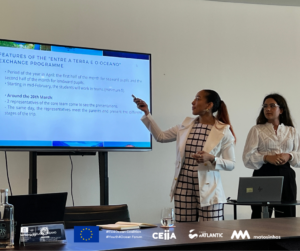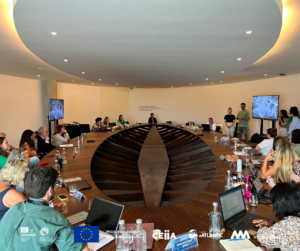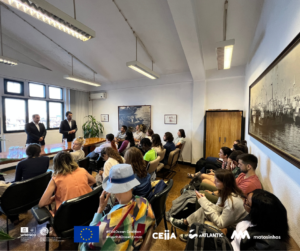In our July newsletter we featured Melany Velásquez-Lozano, the Ocean literacy coordinator at the Observatory for Marine and Coastal Governance, Colombia. Melany was part of the 19 participants who joined the school on Ocean Literacy & Collaboration organized by the IOC-UNESCO team, Youth4Ocean, CEiiA and Matasinhos Câmara Municipal in the framework of the UN Ocean Decade and SDG14. The event took place in Matosinhos (Portugal) whose economy is based on sardine fishing and coastal tourism, and the 5 day school was designed to promote ocean education in communities and schools, and develop the skills and interactions with those that attended. At the end of the event the participants worked on group projects that provided a solution to a problem raised from the organisers.
The group in which Melany was part of consisted of a magnificent team of early career professionals from France and Portugal. The project that they presented and would like to see implemented is called “Entre a Terra e o Oceano” (Between the Land and the Ocean) that establishes a cultural exchange between the inhabitants of the interior and those of the coastal cities. We spoke to Melany to learn more about growing up in Colombia, her work in Ocean Literacy and her experience collaborating with others at the OL school in Portugal.
1- Please give us a quick intro: who are you, where are you from/based and what are you working in/on/with right now in respect to Ocean Sustainability/the UN Ocean Decade.
My name is Melany Velasque-Lozano, I am a chemical engineer and I have a master’s degree in environmental engineering. I work at the Observatory for Marine and Coastal Governance as Coordinator of Ocean Literacy. My work is focused on capacity building of local coastal and island communities, especially Afro-descendants of the Pacific coast, to promote their informed participation in decision-making processes, through workshops and classroom and virtual courses, and the design of pedagogical tools.
In relation to the Decade of the Oceans, we are an accredited organization before the United Nations Ocean Conference. Last year we led a Side Event at the Conference called “Marine Justice and the Right of Science”, in which the UN Rapporteur on Toxics and Human Rights participated, as well as biologists and lawyers from America, Morocco and the Philippines. We also led the signing of the Civil Society Statement for the Political Declaration of the United Nations Ocean Conference 2022: The Right to Science, and an Ethnic and Local Approach to Ocean Literacy, signed by 68 organizations and individuals from various countries, in order to contribute to the UN Political Declaration “Our Ocean, Our Future, Our Responsibility”, in which Heads of State and Government, as well as high-level representatives, were requested to include the recognition of the right to benefit from science and its applications, as well as the recognition of an ethnic and local approach to ocean literacy.

2- Tell us about where you grew up and what your experience taught you about the Ocean – has it shaped your career path, what are some of the challenges/barriers you’ve encountered?
I am Colombian. I was born in Cereté (Department of Córdoba), and I lived and grew up in Sincelejo (Department of Sucre), both cities are close to the Caribbean Sea. I found my love for the ocean in the city where I studied my university degree and where I currently reside, Barranquilla (Department of Atlántico), a city on the banks of the Magdalena River (the largest in the country) and from where you can see the mouth of this river in the Caribbean Sea. Studying chemical engineering I found my affinity for the environmental area, but I found my passion for the oceans in my work; at the Observatory I discovered that the protection of marine and coastal ecosystems, marine biodiversity and the communities that depend on them are issues that the world must bring to the forefront. Also that our work is needed to strengthen these communities so that their needs can be heard.
3- You are working in Ocean literacy within Ocean observations, what do you envision for the future and how do you think we can achieve the science we need for the Ocean we want?
I envision a future where everyone, not just those of us who live in coastal cities or near the coast, but regardless of our geographic location, understand the importance of the ocean to the global ecosystem. I am not just talking about understanding the biodiversity and ecology of the ocean, but recognizing its relevance to climate regulation, the global economy, health and well-being.
We need a world in which political and economic decisions take into account the health of the ocean and where ocean science is accessible to everyone, from children in elementary schools to decision-makers at the highest level.
According to my knowledge and work, added to what I learned in school “Ocean Literacy and Collaboration”, I consider that to achieve the science needed for the Ocean we want we must take into account the following factors:
1- An integrated, early and accessible education for all: introducing interactive modules and programs in schools so that children grow up with knowledge and appreciation for the sea, the same as bringing science to coastal and island communities, especially those who have not been able to access knowledge about the oceans.
2- Interdisciplinary collaboration and openness to traditional knowledge: with these collaborations we will have a holistic view of the ocean and its interaction with society, combining ocean sciences with social sciences, recognizing the traditional knowledge of ethnic peoples and communities dedicated to artisanal fishing.
3-Technology and accessibility: generate investments in technology to observe the ocean and allow access to the essential data provided by them.
4-Community and citizen participation: promote community and citizen science, invite communities to participate in science projects, not only in data collection, but also in analysis, and guarantee access to systematized data and analysis. This strengthens the commitment to ocean protection.
5- Strategic alliances between diverse actors: this creates a broadening of research, conservation and education efforts and resources. In these alliances, non-governmental organizations play a fundamental role in research, creating bridges between science and traditional knowledge, supporting the processes of capacity building of communities and influencing decision-makers.
4- Tell us about your recent participation in the Ocean Literacy summer school in Portugal – what were some of the highlights, why was it beneficial for you?
The summer school has been a very rewarding experience in which I met people who are passionate about ocean literacy. I was able to participate thanks to a scholarship.
I highlight all the talks we received, with the purpose of educating us not only in ocean literacy but also in how we can be convincing in generating a good speech so that those who listen to us recognize that our ideas and projects deserve to be developed in favor of the ocean and the communities. Also with the workshops and activities, we create links and develop interesting ideas based on experiences of problems already studied in each of our home countries.
Last but not least, I want to highlight our final work, which was part of the agenda proposed by the summer school and was a perfect opportunity to put into practice everything we learned in the lectures. The group in which I participated was formed by a team of early career professionals from France and Portugal. The project we designed to implement is called “Entre a Terra e o Oceano” (Between Land and Ocean), which addresses two issues:
1- That the populations of the territory without access to the coasts can have proximity and create an important connection with the ocean.
2- The inclusion of Ocean Literacy in the educational curriculum of Portugal and other countries.
The proposal of this project established a cultural exchange between the inhabitants of the interior and those of the coastal cities.
5-What have you struggled with, or what challenges/barriers are you facing, in terms of working in this area of Ocean Science/Sustainability?
The first obstacle is due to geographical accessibility barriers to reach the communities we work with in remote rural coastal areas. This involves long trips and different types of transportation, which is costly in terms of time and economic resources.
Secondly, Colombia is a country with high rates of violence and insecurity and it is frustrating that my work can be hindered by this. And I am not only referring to physical insecurity, but also to digital insecurity. That is why the organization has worked on the development of security protocols and risk analysis to avoid doing field work in the face of a possible risk.
The third obstacle, which is of a transversal nature, is the limited funds we have for our initiatives and projects. We have diagnoses of community needs based on which we have formulated projects that require funding to be implemented. Our organization has grown in these 4 years of work, and is becoming a reference, but we need institutional support to continue advancing.
6- How can people support you and your work?
We want to continue strengthening our ocean literacy area, because we strongly believe in promoting marine justice and building the capacity of the communities we work with. Fundamental to this is having the appropriate means to research and build bridges between science and traditional knowledge. Funders’ support plays a vital role; every contribution, no matter the size, makes a difference. We also seek alliances with research centers and universities with whom we can continue to strengthen the work area of ocean literacy and our research group “Marine Justice and International Law” endorsed by our organization before the Colombian Ministry of Science.



